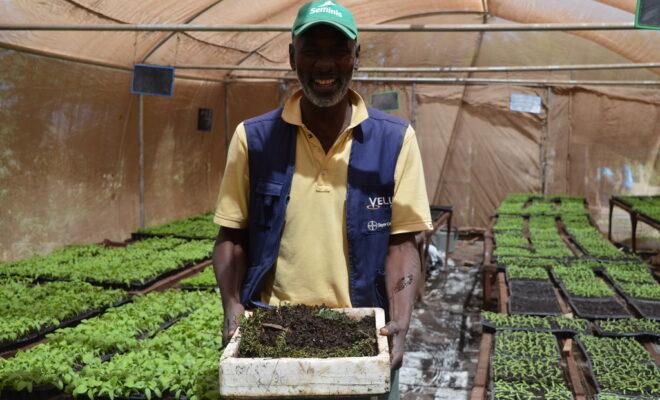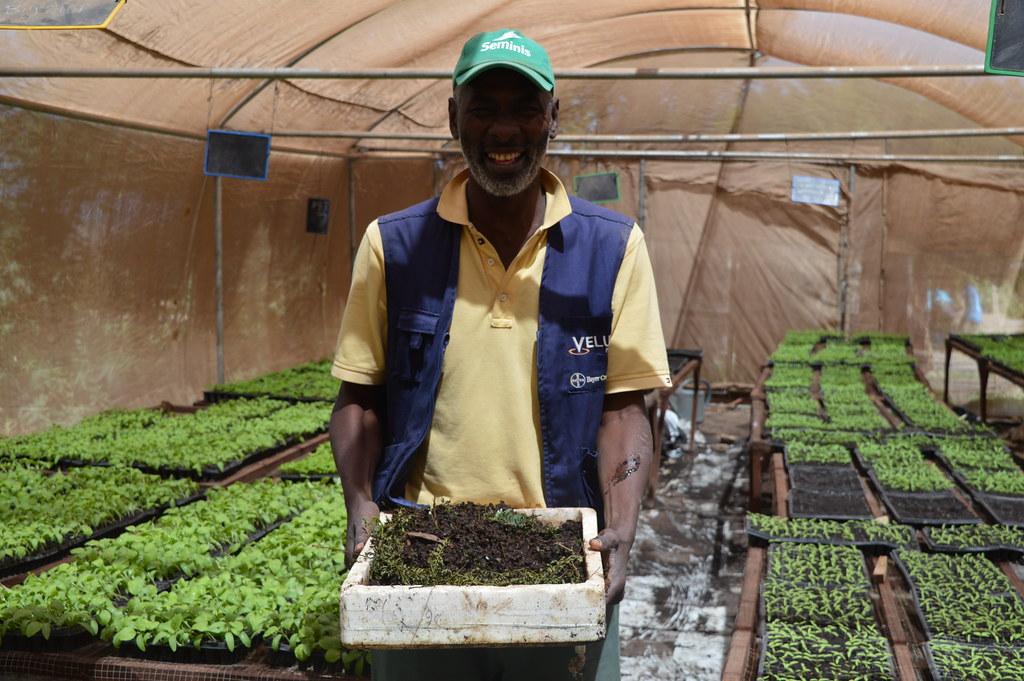For sustainable agriculture in West Africa, let’s leave our echo chambers

Regional governments are supporting agroecology with one hand and business as usual with the other.

A farmer in Senegal tests methods of agroecology on the resilience of crops. Credit: FAO.
Sustainable agriculture is growing fast in West Africa, and the transition is only gaining momentum. Over recent years, Senegal, Burkina Faso and Togo have adopted policies in support of agroecology. The West African bloc ECOWAS has ramped up its support into a fully-fledged agroecology programme and is now a pilot region in the ‘Scaling Up Agroecology’ initiative launched by the UN’s Food and Agriculture Organization. And West Africa’s biggest farmers’ organisation, ROPPA, is engaging with new ideas as a founding member of the Alliance for Agroecology in West Africa (3AO).
These remarkable developments are no coincidence. With temperatures rising 1.5 times faster than global averages, and with 70-80% of the region’s rapidly-growing population living on less than $2 a day, agroecology provides compelling responses to West Africa’s challenges. Agroecology combines different plants and animals, and uses natural synergies – not synthetic chemicals – to regenerate soils, fertilise crops, fight pests, and build resilience to shocks. It is labour intensive and relies on farmers developing knowledge with each other and with scientists. This means agroecology is perfectly adapted to a region where family farms still account for 90% of agriculture and diversified production (‘polyculture’) is still being applied on some 80% of farmland.
Meanwhile, vibrant social movements are defending farmers’ access to land, water and seeds, and spreading agroecological knowledge and training. In other words, West Africa has all the ingredients to sustain the current momentum and become a global frontrunner in transition to sustainable agriculture.
And yet, as the West African agroecology movement gathered this month to consider the next steps forward, thousands of delegates were convening on the other side of the continent for the 10th annual African Green Revolution Forum. Like at previous meets, the Forum looked towards the next generation of production-enhancing technologies and commercialisation opportunities for African farmers – with barely a mention of agroecology. For someone listening in on the exchanges, it wouldn’t be obvious that they were talking about the same planet, let alone the same continent.
This reflects the highly polarised nature of the debate on the future of farming in Africa. And in the face of these widely diverging demands, policy makers have often chosen the simple option: say yes to both.
In West Africa, the same governments that have offered a foothold for agroecology have also embraced the input-intensive, export-oriented approaches of the green revolution school – and have often prioritised the latter in terms of funding. ECOWAS’ support for agroecology is overshadowed by its subsidies for synthetic fertilisers, which still account for more than 80% of its agricultural funding for member states. Within ROPPA, some national chapters still embrace green revolution approaches.
This fragmentation has led to incoherent and inefficient policies. It is putting the brakes on West Africa’s agroecological transition.
In order to provide a clear signal about the future of West African agriculture, both sides need to get out of their echo chambers. In reality, there is some common ground. There is general consensus that Africa can and must reduce its food import dependency; that climate change stands to devastate African agriculture and requires urgent action; and that investment in agriculture must be at the heart of COVID-19 recovery plans. As such, many of the farmers, food industry representatives, researchers and government officials called upon to enact an African green revolution may in fact find the answers to their concerns under the umbrella of agroecological transition. Moreover, in the face of unprecedented climate and disease threats, they have a major role to play in building the ever-evolving knowledge base on agroecology and making it a reality on the ground.
The debate on the future of agriculture, in West Africa and across the continent, can no longer take place in echo chambers. Only by talking the same language, and considering the same evidence, will we find the common pathways that are so desperately needed.
With an ever-more vocal and unified agroecological movement, and with renewed leadership from ECOWAS, these challenges can be overcome in West Africa. The region can lead the way towards an inclusive debate, and towards a sustainable future through agroecology.
The authors are members of the International Panel of Experts on Sustainable Food Systems, which released a report on 7 September entitled ‘The Added Value(s) of Agroecology: Unlocking the potential for transition in West Africa’.






